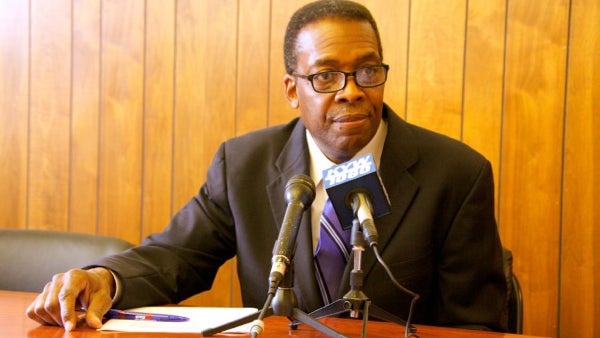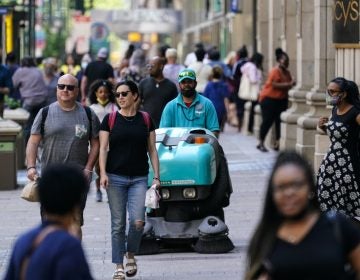Pa. budget secretary questions Clarke’s Philly schools plan

Philadelphia City Council President Darrell Clarke wants to direct $70 million of the sales tax revenue to the schools, and use the rest of it for debt service and the city's chronically underfunded pension system. (Nathaniel Hamilton/for NewsWorks)
The tug-of-war between the city and the state over how to keep the Philadelphia School District solvent heated up on Wednesday, with City Council President Darrell Clarke announcing that he is not on board with a key piece of the funding package worked out in Harrisburg — dedicating $120 million to the schools in future years by extending a 1 percent local sales tax.
Instead, Clarke wants to direct just $70 million of the sales tax revenue to the schools, and use the rest of it for debt service and the city’s chronically underfunded pension system.
“If we don’t fix our local pension problem, we’re going to be looking at the School District of Philadelphia-type of scenario for the City of Philadelphia,” Clarke said. “We’re going to have a real problem in a very, very foreseeable future.”
He said that city leaders had been eyeing the sales tax as a potential solution to the pension crisis for years.
“What we don’t want to do is simply sit silent while that component of something that we have been working on for a couple of years now essentially gets taken off the table,” he said.
In order to make up for the lost funds, Clarke’s plan counts on the state anteing up an extra $45 million annually in future years, perhap by reinstating charter school reimbursements. That state budget line item, which once sent $110 million to Philadelphia, has been eliminated for the past two years.
Clarke is also hoping the General Assembly will authorize a $2 tax on every pack of cigarettes in Philadelphia, which he said would generate $46 million for the schools this budget year and as much as $90 million later.
Clarke likely will face an uphill battle. Charles Zogby, Pennsylvania’s budget director, called it “troubling” that Clarke wants to send less than $120 million from the sales tax to the schools.
“We have an immediate crisis with the schools that’s on us right now. The SRC has put in place a doomsday budget that just calls for skeletal staffing of schools,” Zogby said. “Seems to me that when your house is burning, we ought to use the water to put the fire out, not save it for another day for some other crisis that may be looming down the road.”
Education advocates also question Clarke’s plan
Donna Cooper, executive director of the nonprofit Public Citizens for Children and Youth, said she gives Clarke credit for focusing on the pension problem. But she wants the schools to get the full $120 million from the sales tax.
“The citizens of Philadelphia have enormous concern for the schools, and the crisis is immediate,” she said. “It seems to me the next thing we should do is work to get the state to give us the authority to find revenues to fix the pension, but not rob Peter to pay Paul at this point.”
Mark McDonald, a spokesman for Mayor Michael Nutter, said the city needs to review the details of Clarke’s plan. The Nutter administration supports sending $120 million to the schools from the sales tax.
With the district’s $304 million budget gap, the School Reform Commission laid off more than 3,800 employees — about 20 percent of its workforce — and is preparing to open schools in September without secretaries, counselors, support staff or other key workers. It asked for $180 million in combined state and city funds, and $133 million in labor concessions.
Zogby, a former state education secretary, helped put together Gov. Tom Corbett’s funding package for the district that comes up with about $127 million in additional city and state aid.
Funding breakdown
Compared with the governor’s original spending proposal for 2013-14, it includes an additional $2 million in basic education funding and a one-time $45 million state payment generated as a result of the federal government apparently forgiving a years-old debt. The rest is $50 million from a loan guaranteed against the future sales tax revenue, and additional city tax collections.
The state will not release the $45 million in extra aid until Corbett’s education secretary concludes that the school district has “begun implementation of reforms that will provide for the district’s fiscal stability, educational improvement and operational control,” according to legislation authorizing the payment.
Those “reforms” are expected to include major labor changes.
In addition to cuts in salaries and benefits, the School Reform Commission wants to revise how teachers are assigned to schools and create a new compensation system based more on performance, and less on longevity and degrees earned.
For the current budget year, Corbett’s plan does not count on raising $120 million from the 1 percent sales tax because it is currently being used by the city.
Zogby: Corbett’s funding package “isn’t perfect,” but a “good solution”
Zogby said that while the funding package “isn’t perfect,” it was the best that could be achieved given the political and budgetary climate in Harrisburg.
“There’s simply not $120 million in the general fund that could have been sent to Philadelphia,” he said, “and given the need that the SRC outlined, the extension and redirection of the sales tax was in our minds the most achievable solution … it was maybe not a perfect solution, but it was a good solution and the only one that we were able to achieve.”
As Zogby sees it, the district will not have a portion of the extra aid in hand until the teachers’ contract — including labor changes satisfactory to Harrisburg — is signed. Negotiations are ongoing, but the contract doesn’t expire until Aug. 31, just days before school is scheduled to open.
“The PFT contract would be the linchpin of whether the monies flow or not, both in terms of savings and the reforms initiated,” he said.
As to whether the state will take up Clarke’s suggestion to boost funding to the city schools by $45 million in future years, Zogby said he didn’t see that as in the cards. Sending that kind of money to Philadelphia would involve increasing funds for school districts across the board, he argued.
“To send Philadelphia $120 million would probably require half a billion, because other members of the General Assembly would not want to see that kind of money go to Philadelphia and not have their school districts get increases as well,” he said.
As for the cigarette tax, Zogby said that opposition to the authorizing legislation did not come from the governor’s office, but from the General Assembly.
“It was just a piece that we found we could not enact,” he said. “And I’m not sure that I’ve seen anything in the landscape that’s changed to suggest that that is gettable.”
Corbett visited Philadelphia yesterday to celebrate the opening of a new trade and business office in the Chilean consulate. Asked afterwards about Philadelphia’s schools, he said that he worked to find a solution “for the children” of the city.
The state took over the Philadelphia schools in 2001, during a prior financial crisis. The arrangement, he said, gives the state the obligation “to work closely with the city.”
But, Corbett added, “while the state may have taken them over … they still belong to the people of the city of Philadelphia. And we’re there to try to assist. And, you know, I’m not going to grade the effort at this point in time. But it is a project that everybody has to be involved in. We have to bring reform. We have to bring the cost of education to a point that is affordable for everybody.”
WHYY is your source for fact-based, in-depth journalism and information. As a nonprofit organization, we rely on financial support from readers like you. Please give today.




